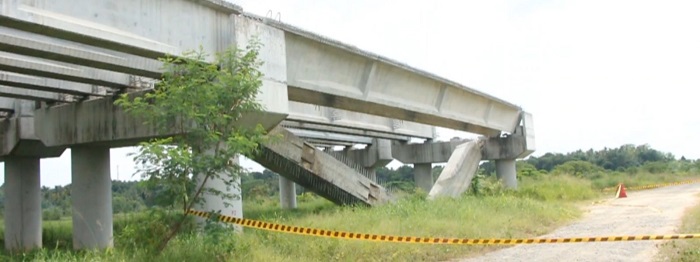Colombo: The construction quality of the Chinese-built infrastructure projects has become the talk of town again after a section of the Central Expressway in Sri Lanka collapsed.
The sudden collapse of the 35-metre-long beam has caused concerns. The accident has not led to financial losses to Sri Lanka but has posed a threat to the safety of the entire Kadawatha -Mirigama section of the expressway and other similar projectsbeing built by Chinese companies.
A probe has been ordered to investigate why the beam collapsed. A Sri Lankan authority has found two other beams were in dangerous condition. Now it is expected to check the quality of the entire highway section that is built by the Chinese company Metallurgical Corporation of China (MCC).
According to the Road Development Authority (RDA) in Sri Lanka, the collapse of pillars has led to the loss of LKR 66 million since they cannot be used now. If the investigation finds the entire built portion of the expressway is of inferior quality, the losses could be in billions. This would lead to a clash between Sri Lanka and Chinese company MCC over who bears the responsibility and losses.
China has dominated the construction of infrastructure works in Sri Lanka under its Belt Road Initiative (BRI).The construction work of the highway has been stuck for a long time, adding to the debt burden since Sri Lanka took a loan from the Exim Bank of China.
International Monetary Fund (IMF) has already expressed concerns over the alarmingly high construction cost in Sri Lanka, which it found to be three times the global average. The Central Expressway was touted as the World’s costliest expressway. Now, the delays by the Chinese contractors have caused a further increase in the expenditure of different infrastructure projects.
Notably, the Chinese Embassy in Sri Lanka had claimed the expressway construction work would lead to the creation of around 1,500 jobs. China made similar claims for other projects it built in Sri Lanka. However, the ground realities are quite the opposite. The Sri Lankan construction sector has a significant contraction of 60 percent, which led to losses of 500,000 jobs.
Sri Lanka has been reported to have fallen into a ‘debt trap’ thanks to unsustainable Chinese loans for infrastructure projects. BRI-led infrastructure activities such as Hambantota Port and Mattala Rajapaksa International Airport have led Sri Lanka toward the debt problem. So Colombo is struggling to generate revenue, which can be used for debt repayment. China continues to be non-committal about Sri Lanka’s debt restructuring requests.
About 71 percent of China-funded projects in Sri Lanka saw an increase in cost while 50 percent were of poor quality, found Investigative Journalism Reportika in its investigative news report. “The majority of projects have suffered from cost overruns, highlighting the financial difficulties encountered in these initiatives,” it said. “Delays have plagued a substantial portion of projects, indicating the inability to meet expected timelines.”
Against this backdrop, poor-quality construction works add to the problem. Many farmers lost their fertile land to make way for the Central Expressway project in 2020. However, the construction activity remained suspended often leading to the growth of weeds and stagnant water under the half-constructedpillars. The China-funded project led to substantial and permanent loss and fragmentation of natural terrestrial habitats.
People protested the acquisition of their land, which they said was forceful and was not remunerative. An old couple from the project area had said “We used to grow fruits and vegetables. That is no longer possible. We can’t spend much money on repairs to the house since we know it’ll be demolished once it is with the Government. Our children and grandchildren have left the place. Every sense of a normal life is gone.”
Moreover, the Chinese activities would cause relocation, livelihood loss and environmental damages, warned the Environmental Impact Assessment. “Changes in land-use pattern will also have a significant impact on livelihood and local economy… Closure of easy access by the expressway may deprive people of livelihoods by reducing work and business,” it read.
Also, the project led to concerns among communities about uncertainty of life, properties, future settlement and livelihood, education of children, and care of elders. “The proposed expressway traverses causing a bifurcation in rural and urban communities and this rigid separation has a negative impact of the economic activities of people,” it noted.
